


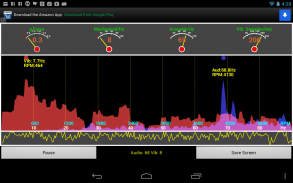
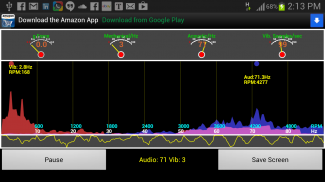
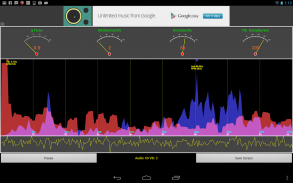
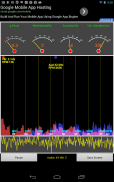
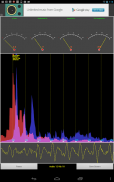
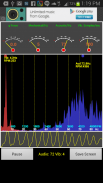
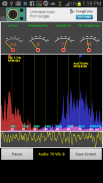
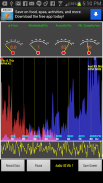
Vibrations! (Ads)

Vibrations! (Ads) ਦਾ ਵੇਰਵਾ
Vibrations is an app for measuring mechanical vibrations and acoustic noise from engines, the environment, machines, and other equipment. (Ads supported.)
This is (currently) the only app that combines acoustic *and* mechanical measurements!
Uses: monitoring vehicle engine vibration, monitoring vibrations of household appliances (dishwasher, refrigerator, waste disposal units, clothes dryers, etc.), measuring g-force in moving vehicles, helping to identify failing gears, evidenced by knocking sounds, modes, etc..
Vibrations uses data streams from the built-in accelerometer and microphone: it calculates two simultaneous FFTs, one from the mechanical measurements, one from the audible measurements. It then shows the frequency spectra on the screen. The frequency axis is labelled in Hz and RPM (revolutions per minute).
Four on-screen software gauges give an overview of the measurements:
1) The g-force (excluding gravity), which measures acceleration
2) The frequency of the current peak in the mechanical/vibration noise
3) The frequency of the current peak in the acoustic noise
4) The sample rate at which mechanical vibrations are being measured
Screen shots can be taken using the "Save Screen" button, and stored to the SD card.
Time series of accelerometer data (up to 20 seconds) can be recorded and saved using the "Record Data" button. Since data are continually being gathered, the recorded data written to the file actually starts a second or so *before* the button was pressed. Recording can be interrupted while in progress, and the data discarded or saved. Otherwise, the recording will automatically terminate after 20 seconds have elapsed, and the data discarded or saved then.
Data collection for the screen and record mode can be paused and resumed using the "Pause"/"Resume" button.
Please contact me if you have suggestions for improvements or enhancements (or to report problems).
Also, please note that the frequency limit of the mechanical vibration measurement is limited by the maximum rate that accelerometer samples can be obtained from the Android device: this typically varies from device to device - e.g. on the Nexus 7 and 10 tablets, the rate is ~200 samples/sec, giving a maximum frequency measurement of ~100Hz or 6000 RPM. On the Galaxy S3 the rate is ~100 samples/sec, giving a maximum frequency of ~50Hz.

























